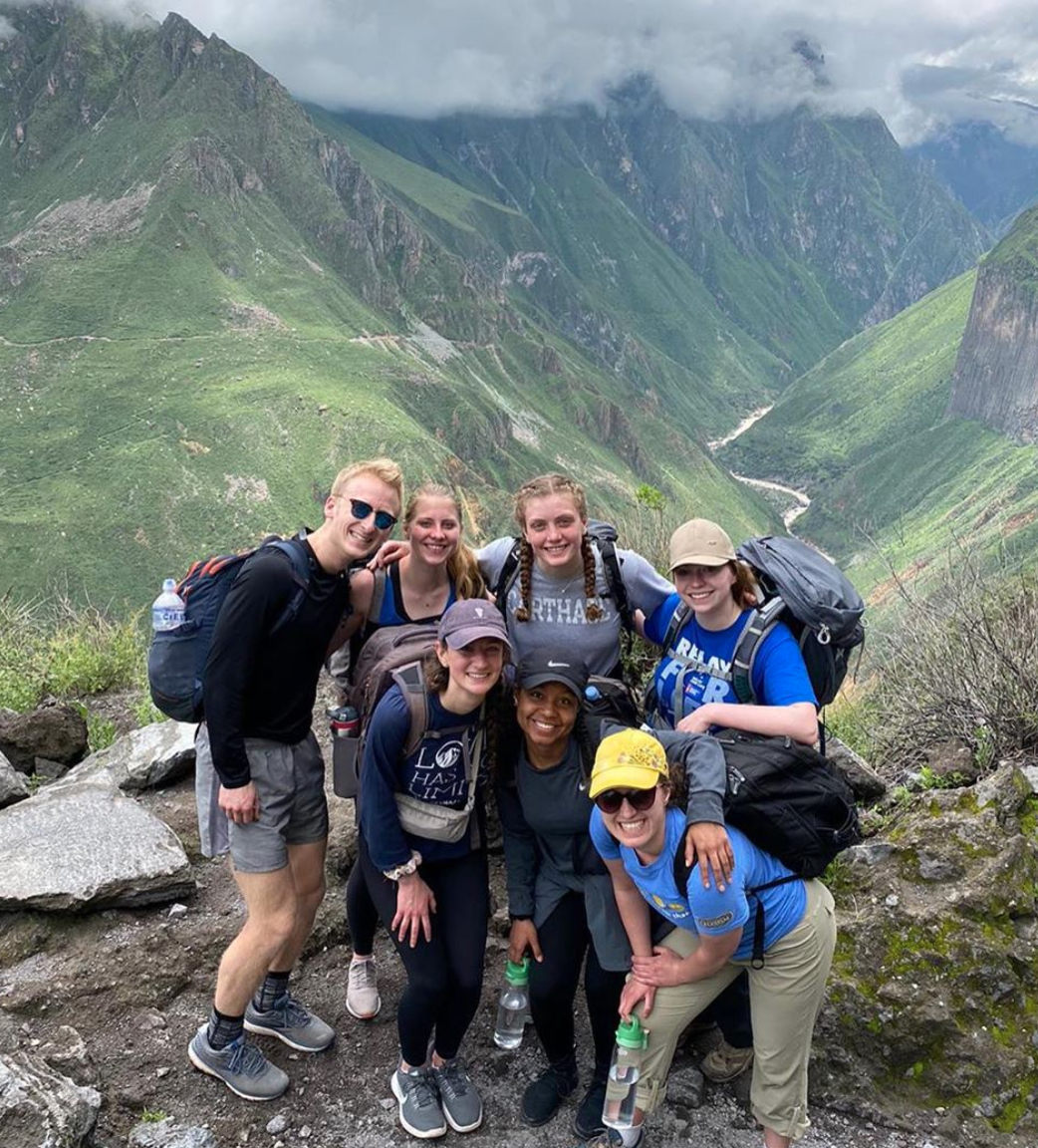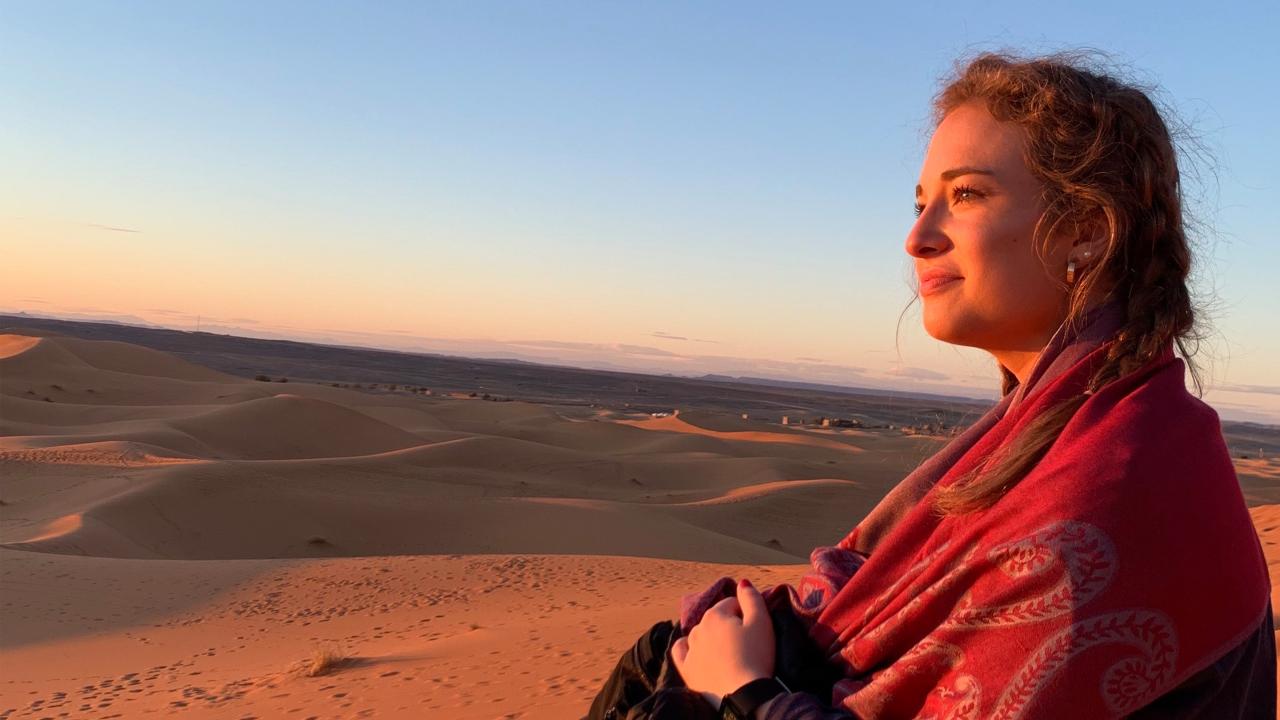What Could Have Been
If you ask anyone on Augustana’s campus about the university’s one-month January Interim, in so many words they’ll tell you it’s a special time for deep curricular exploration — whether it be in Sioux Falls or another country. While there are nearly 80 Viking Flex Plan courses taking place (either face-to-face or online) this J-Term, study away and group customized (inbound) programs were not an option due to the challenges related to COVID-19.
 If not for the pandemic affecting the globe, Augustana students would be on in-depth learning adventures in places like Belize, Costa Rica, France, Germany, Greece, Guatemala, Hawaii, Iceland, India, Ireland, Kenya, London, Morocco and Spain, as part of more than a dozen faculty-led study away courses.
If not for the pandemic affecting the globe, Augustana students would be on in-depth learning adventures in places like Belize, Costa Rica, France, Germany, Greece, Guatemala, Hawaii, Iceland, India, Ireland, Kenya, London, Morocco and Spain, as part of more than a dozen faculty-led study away courses.
Augustana’s Director of International Programs and Enrollment Ben Iverson said, “We might have had nearly a couple hundred students and 20-plus faculty on almost every continent this January. Pre-pandemic, we just had incredible initial interest among students and faculty in study abroad.”
In addition to Augustana students studying away, in January of 2020, the university and IPO hosted nearly two dozen international (high school and college) students from St. Paul Gymnas in Bergen, Norway, and Guangxi University in Liuzhou, China. The new program was also put on hold in 2021.
“It was fantastic. We had a blast hosting them — in part we are thinking of these in-bound programs as vehicles to get more international students on campus because we love the diversity even if they’re here for a short time, but we also think they may be avenues for future enrollment for us as some of those students presumably like it here on campus and in Sioux Falls and might choose to return for an undergraduate or graduate program someday,” said Iverson.
IPO welcomed 15 new degree-seeking international students to campus this fall — a majority of them were afforded the opportunity because they had previously studied in high schools in the U.S. and already had a visa. In a typical year, anywhere from 25 to 40 new international students join Augustana each fall.
“While substantially lower than normal years, this was a pretty big win due to the fact that we were just excited to have any new international students,” said Heather Edmunds Reed, assistant director of IPO operations and customized international programs. “I feel like this group of new students has really bonded because this group is so small, and I also feel like they recognize how fortunate they are that they were able to start their college journey.”
What Could Be
“While many U.S. Embassies remain closed overseas, and study travel in some cases may be a little bit different, we’re persevering,” said Iverson.
Persevering and hoping that study abroad students decide to simply delay their plans, and like IPO, look ahead to perhaps the summer, as well as 2022.
“Our faculty are amazing. They just keep coming up with these really good ideas and they’re really not deterred. They know this (COVID) is happening and they have to be realistic, but they also haven’t really lost momentum of the future of study abroad," said Associate Director of International Programs Erin Kane. “One faculty member proposed a summer ‘21 course, so we hope we’ll be able to run it — nature writing in Alaska with Dr. (David) O’Hara. We’re going through how to plan and prepare in the age of COVID, how we mitigate risks as much as we can for the students, as well as for those in the places they’re going.”
IPO has not lost momentum with Augustana’s international partners either — particularly the university’s Norwegian partners. Just like the university’s faculty members, the pandemic has also pushed them to think more deeply about virtual exchange.
Iverson added, “Normally, we would send some of our nursing students, for instance, to Norway in January, and we would receive some Norwegian nursing students for fall and spring semester. We’re missing that cultural dynamic in at least some of our classes, so we’re starting to have more serious conversations about what we can do virtually.”
The School of Education just hosted a pair of virtual lectures with Nord University — one by an Augustana professor, and one by a Norwegian professor, along with some time for students to interact.
“I thought it went really well and I hope these small virtual exchanges are one “positive” outcome from the pandemic that will endure even after study abroad travel returns,” said Iverson. “The pandemic illustrates that we have problems before us that are borderless. We need people who are epidemiologists, but who also understand politics, international economics, history and cultural approaches to handling problems — that perspective is really important,” Iverson added.
Iverson says more than half of Augustana students, under normal circumstances, study abroad by the time they graduate, but that means slightly less than half don’t. He’s “optimistic that through piloting and developing more resources around these virtual kinds of exchanges, the university will ultimately be able to impact more students” even if they can’t or don’t want to study away.
And when it’s safe, IPO hopes to be able to send and receive students both physically and virtually.
Where Students, Faculty, IPO Have Been
In March, when the novel coronavirus made its way to the U.S., Augustana extended its spring break to give faculty time to transition their classes online. The university then made the difficult decision to send students home for the remainder of the semester to finish their classes via online instruction. All of this meant IPO had to cancel its spring break courses. Within two weeks of that decision — as the infection migrated and countries began closing their doors — it had to start pulling students back from different locations; Italy being the first, the United Kingdom and Australia being two of the last.
“Every day, every minute, it seemed things, information, just changed so quickly that those decisions evolved pretty rapidly,” said Kane. “Many of them needed help getting back so it was booking online tickets, hotels, trying to get updated on incoming border patrol procedures so students could be prepared, know what to expect.”
IPO says they ended up bringing 18 students home, including three in Washington, D.C. The university had also welcomed its first cohort of nursing students from Norway, who halfway through, had to be sent home. For many, this is the only time these opportunities worked in their schedules. Others count on these courses for credit, and because of the timing, many of them hadn’t earned any.
“Our faculty made courses for them. So, not only did they change their courses to remote midstream, but they found a way for these students to get a full semester of credits. It was amazing. They should get credit for their tenacity and willingness to do something like that,” added Kane.
And regardless of what happens, IPO says it will keep adjusting and optimistically planning for the future.
